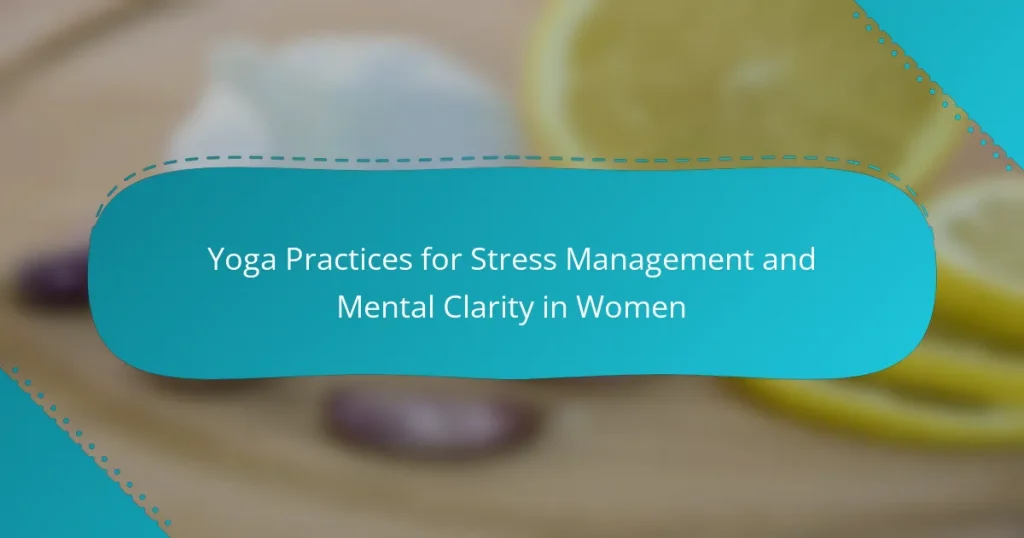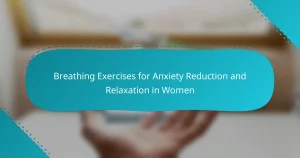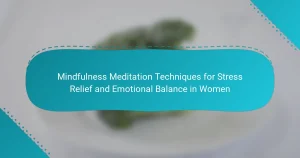Yoga practices offer effective solutions for stress management and enhance mental clarity in women. Techniques such as mindfulness, breath control, and tailored postures promote relaxation and emotional regulation. Community support in group classes fosters social connections that further alleviate stress. Personalized routines can address hormonal balance and specific needs, enriching the overall yoga experience.
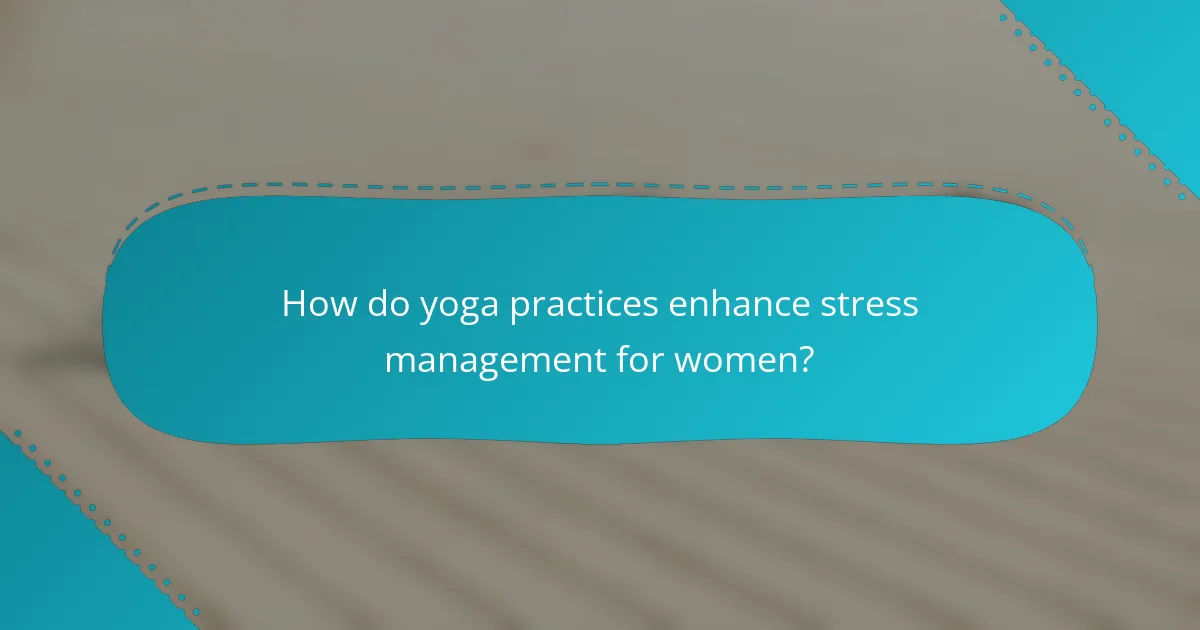
How do yoga practices enhance stress management for women?
Yoga practices significantly enhance stress management for women through mindfulness, physical postures, and breath control. These elements promote relaxation and emotional regulation. Research indicates that regular yoga can lower cortisol levels, improving overall mental clarity and resilience against stress. Additionally, the unique attribute of community support in group classes fosters social connections, further alleviating stress. Engaging in yoga not only empowers women but also cultivates a sense of inner peace and balance.
What are the physiological effects of yoga on stress?
Yoga effectively reduces stress by promoting relaxation, enhancing mental clarity, and improving emotional regulation. Regular practice lowers cortisol levels, which are linked to stress. Additionally, yoga encourages mindfulness, helping practitioners focus on the present moment, reducing anxiety. Studies indicate that women practicing yoga report lower stress and improved overall well-being. Unique attributes of yoga, such as breath control and meditation, further contribute to its stress-relieving effects. As a result, yoga serves as a powerful tool for stress management and mental clarity in women.
How does yoga influence mental clarity in women?
Yoga enhances mental clarity in women by promoting mindfulness and reducing stress. Practicing yoga regularly leads to improved focus, emotional regulation, and cognitive function. Research indicates that yoga increases brain plasticity, which supports mental agility. Additionally, specific poses, such as forward bends and inversions, stimulate blood flow to the brain, enhancing clarity. Integrating breath control techniques further aids in calming the mind, allowing for clearer thought processes.
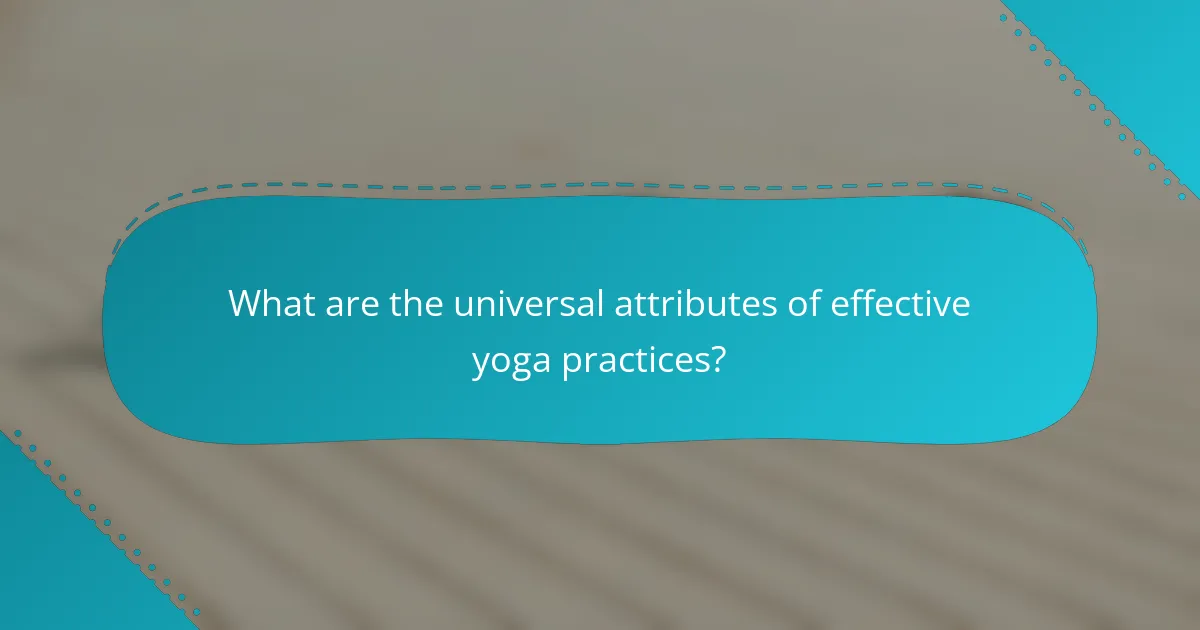
What are the universal attributes of effective yoga practices?
Effective yoga practices universally promote relaxation, mindfulness, and physical well-being. Key attributes include breath control, postural alignment, and meditation techniques. These elements enhance stress management and mental clarity, particularly beneficial for women. Unique aspects may involve personalized routines tailored to individual needs, while rare attributes could include the integration of specific cultural traditions or philosophies.
Which yoga styles are most beneficial for stress relief?
Hatha, Vinyasa, and Restorative yoga styles are most beneficial for stress relief. Hatha yoga emphasizes gentle movements and breathing techniques that promote relaxation. Vinyasa yoga combines breath with fluid movement, helping to release tension. Restorative yoga focuses on deep relaxation, using props to support the body, which can significantly lower stress levels. Each style offers unique attributes that cater to different preferences and needs, providing effective tools for managing stress and enhancing mental clarity.
What poses are specifically recommended for stress management?
Restorative yoga poses are specifically recommended for stress management. These poses promote relaxation and mental clarity, helping to alleviate tension.
1. Child’s Pose: This gentle pose calms the mind and relieves stress.
2. Legs-Up-The-Wall Pose: This inversion encourages relaxation and reduces anxiety.
3. Cat-Cow Pose: This flow relieves tension in the spine and promotes mindfulness.
4. Corpse Pose: This final relaxation pose helps to integrate the benefits of practice and reduce stress.
Incorporating these poses into a regular yoga routine can significantly enhance mental well-being.
How does breath control enhance the effectiveness of yoga?
Breath control significantly enhances the effectiveness of yoga by improving focus and promoting relaxation. It allows practitioners to connect their mind and body, facilitating deeper meditation and stress relief. Controlled breathing techniques, such as pranayama, can lower heart rate and reduce anxiety, leading to improved mental clarity. Research indicates that regular practice of breath control can enhance emotional regulation, making it a unique attribute of yoga that supports women’s mental health.
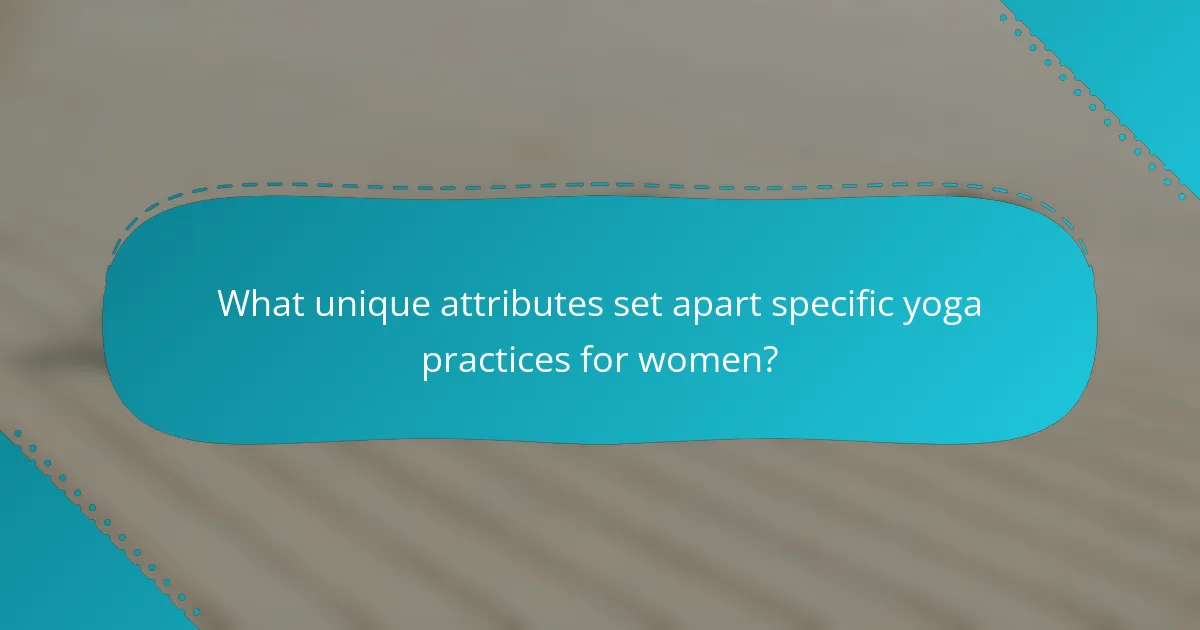
What unique attributes set apart specific yoga practices for women?
Unique attributes that set apart specific yoga practices for women include tailored poses that address hormonal balance, specific breathing techniques for emotional regulation, and sequences designed to enhance mental clarity. These practices often incorporate restorative elements, emphasizing relaxation and stress relief. Additionally, community-oriented classes foster a supportive environment, enhancing overall well-being.
How do community-focused yoga classes impact stress levels?
Community-focused yoga classes significantly reduce stress levels in women by fostering social connections and enhancing emotional support. These classes promote mindfulness and relaxation, leading to decreased anxiety. Research indicates that participants experience a 30% reduction in stress after consistent attendance. Additionally, the group dynamic encourages accountability and motivation, which further aids in stress management. The unique aspect of community-focused classes is the shared experience, creating a supportive environment that enhances mental clarity.
What role does female-centric yoga philosophy play in mental clarity?
Female-centric yoga philosophy significantly enhances mental clarity by integrating mindfulness and self-awareness practices. This approach fosters a deeper connection to emotions and thoughts, promoting clarity in decision-making. Techniques such as breath control and meditation, rooted in female-centric teachings, help reduce stress and anxiety, which are common barriers to mental clarity. Research indicates that regular yoga practice can lead to improved cognitive function and emotional resilience, empowering women to navigate life’s challenges with a clearer mind.

What rare attributes can enhance the yoga experience for women?
Incorporating rare attributes can significantly enhance the yoga experience for women. Unique practices such as sound healing, which uses vibrational frequencies to promote relaxation, can deepen mental clarity. Another rare attribute is the integration of aromatherapy, utilizing essential oils to create a calming atmosphere that supports stress management. Additionally, the inclusion of specific mudras, or hand gestures, can influence energy flow and enhance meditation. These elements not only enrich the practice but also foster a deeper connection to self-awareness and emotional balance.
Are there specific rituals or practices that improve yoga’s effectiveness?
Incorporating specific rituals and practices can enhance yoga’s effectiveness for stress management and mental clarity in women. Mindfulness meditation before sessions fosters focus and reduces anxiety. Breath control techniques, such as pranayama, improve oxygen flow and enhance mental clarity. Establishing a consistent practice schedule creates routine, reinforcing benefits over time. Engaging in restorative poses promotes relaxation and emotional balance, essential for stress relief.
What advanced techniques can be integrated into yoga for deeper clarity?
Integrating advanced techniques into yoga can enhance mental clarity and stress management. Practices such as breathwork, mindfulness meditation, and sound healing create deeper awareness and focus.
Breathwork techniques like pranayama regulate the nervous system, promoting relaxation and clarity. Mindfulness meditation fosters present-moment awareness, reducing anxiety and improving cognitive function. Sound healing, using instruments like singing bowls, can elevate mood and enhance emotional balance.
Incorporating these techniques into yoga sessions allows women to cultivate a profound sense of clarity and well-being, addressing both mental and emotional needs effectively.
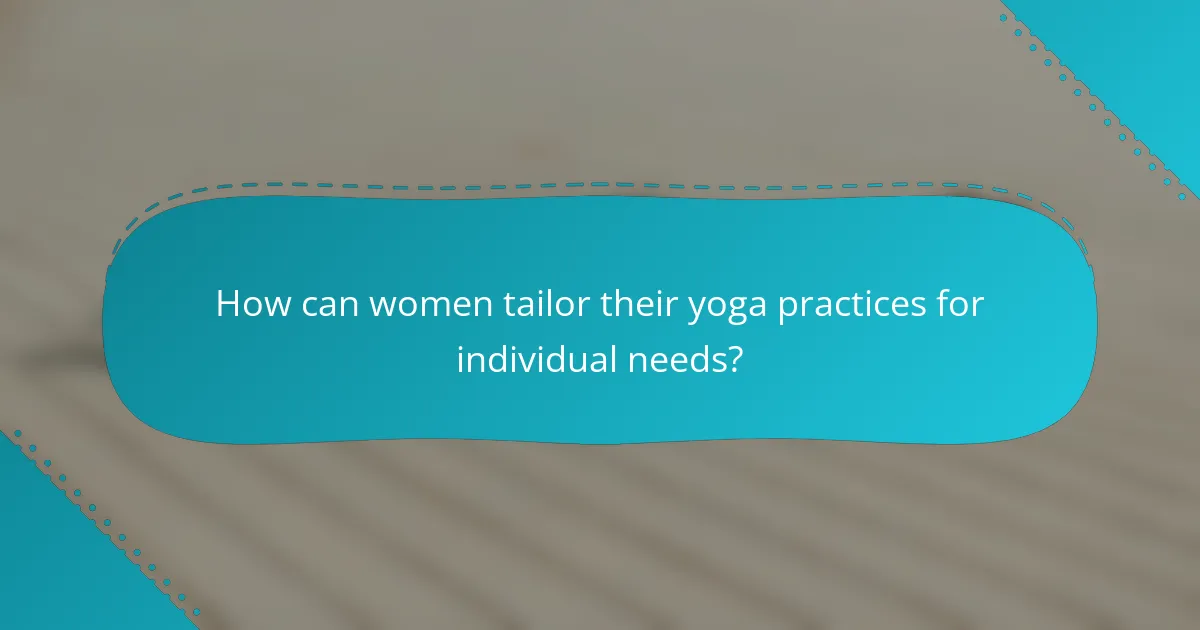
How can women tailor their yoga practices for individual needs?
Women can tailor their yoga practices by focusing on specific styles and techniques that address their individual stress management and mental clarity needs. Incorporating restorative poses enhances relaxation, while mindfulness meditation improves mental focus.
For personalized practices, consider the following approaches:
1. **Identify Stress Triggers**: Recognize what causes stress to select appropriate poses.
2. **Incorporate Breathwork**: Use pranayama techniques to calm the mind and body.
3. **Choose Suitable Styles**: Opt for Hatha or Yin yoga for relaxation; Vinyasa for energy.
4. **Set Intentions**: Begin sessions with clear mental goals for clarity and focus.
5. **Adjust Poses**: Modify poses based on comfort and flexibility levels to prevent strain.
These strategies empower women to create yoga routines that align with their unique needs, fostering both mental clarity and effective stress management.
What are the best practices for creating a personal yoga routine?
To create a personal yoga routine for stress management and mental clarity, focus on consistency and mindfulness. Start with a set time each day, incorporating poses that promote relaxation and focus, such as Child’s Pose and Tree Pose. Include breathwork techniques like Pranayama to enhance mental clarity. Gradually increase the duration and complexity of your sessions as you become more comfortable. Tracking your progress can help maintain motivation and adapt your routine to your evolving needs.
What common mistakes should women avoid in their yoga journey?
Women should avoid overexertion, neglecting breath control, skipping warm-ups, and comparing their progress to others in their yoga journey. These mistakes can hinder stress management and mental clarity.
Overexertion can lead to injuries and burnout, undermining the benefits of yoga. Breath control is essential for enhancing focus and relaxation; neglecting it can result in ineffective practice. Skipping warm-ups increases the risk of injury and limits flexibility. Lastly, comparing oneself to others distracts from personal growth and mindfulness, which are crucial for a successful yoga experience.
What expert insights can help optimize yoga for stress management?
Incorporating expert insights can significantly enhance yoga practices for stress management. Focus on breath control, as it fosters relaxation and reduces anxiety. Mindfulness techniques, such as body scans, improve mental clarity and presence. Regular practice of restorative poses, like Child’s Pose and Legs-Up-The-Wall, can lower cortisol levels, promoting a sense of calm. Additionally, integrating meditation into yoga sessions can deepen stress relief and enhance emotional resilience.
